Gynecomastia is a prevalent condition characterized by an abundance of breast tissue in males. Whether it’s caused by excess gland tissue, fat tissue, or both, we understand the importance of addressing the causes, symptoms, and treatments of gynecomastia. Whether you’re an adult dealing with gyno, an adolescent going through changes, or even experiencing gynecomastia due to steroid use, we’ve got your back. Let us help you regain your confidence and get back on track to achieving your fitness goals.
At the Boston Gynecomastia Specialists, we offer personalized solutions to address your concerns. With our experienced team and advanced techniques and technologies in our private facility, we provide a range of cost-effective, safe and effective treatments customized to meet your needs.
Schedule your personalized consultation today to get started on your transformation.
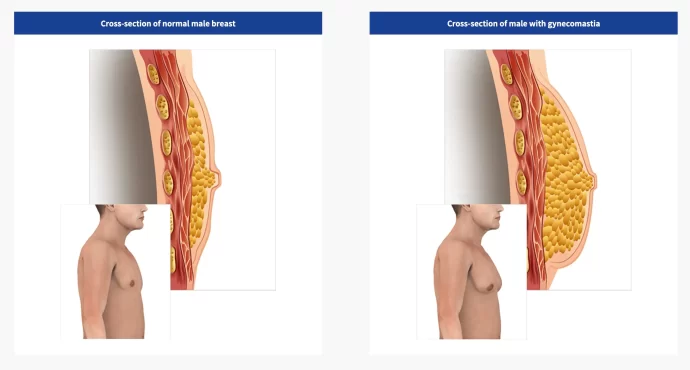
The most common cause of True Gynecomastia is unknown or unspecified; However, hormonal imbalance is a primary diagnosable medical cause of gynecomastia, as it disrupts the natural balance between estrogen and testosterone levels in men. Estrogen, the female hormone, is present in small amounts in men, but an increase in estrogen or a decrease in testosterone can lead to the growth of excess breast tissue. This imbalance may occur during specific life stages, such as puberty or aging, when hormonal fluctuations are more common. Conditions like hypogonadism, where the body produces insufficient testosterone, or obesity, which can increase estrogen levels due to fat tissue, are also contributors to hormonal imbalance, certain chronic diseases, alcohol and substance abuse as well as numerous prescription medications which may cause hormonal imbalance. Managing these hormonal fluctuations can help address the root cause of gynecomastia.
Certain medications and medical conditions can also contribute to the development of gynecomastia. Some common medications and health issues include:
If you suspect any of these factors are contributing to your gynecomastia, it’s essential to consult with your healthcare provider for proper evaluation and potential treatment options.
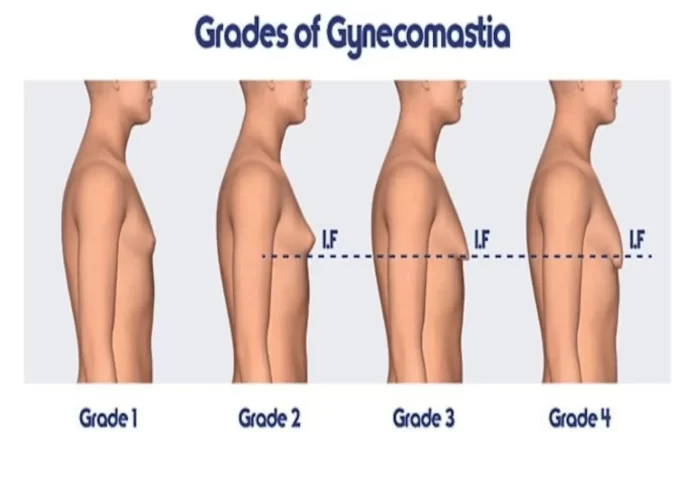
Gynecomastia is classified into four gradess ranging from grade 1 (mild or “puffy nipples”) to grade 4 (severe). Each stage has distinct characteristics or components that distinguishes it from the others. Treatment approach and recovery course for each man’s condition will depend on the grade and components of his gynecomastia as well as other factors including age, general health and realistic expectations of outcome.
You can review the gynecomastia grades for a more detailed discussion of this grading system.
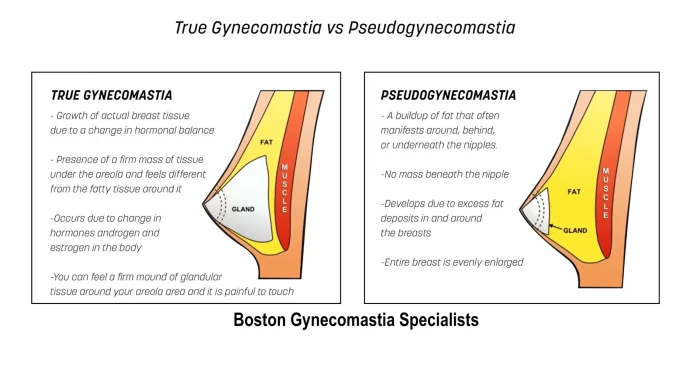
Although Pseudogynecomastia is a commonly used term, Dr. Ishoo believes this condition is is described as chest enlargement due to fatty deposition without abnormal enlargement of breast gland tissue, to be extremely rare, as there is some abnormal enlargement in nearly all cases of obesity and there are nearly no cases of isolated fatty depositions in the chest area in the absence of obesity.
In cases where there is no evidence of abnormal enlargement of breast gland contributing to chest fullness, weight loss or lifestyle modifications can address the generalized fatty deposits.
However, if in the rare individual in whom the chest fullness is due only to excess fat and unresponsive to lifestyle changes, removal of the excess fatty tissue through liposuction is the preferred treatment recommendation.
It is important to emphasize that for the vast majority of cases of gynecomastia, there is both extra gland tissue and extra fatty tissue for which proper surgical treatment involves removal of both the extra breast gland tissue and excess fatty tissue through a combination of excision and liposuction.
The best way to know what may be your true condition and therefore the most appropriate treatment is to schedule a consultation with the Boston Gynecomastia Specialists today.
The symptoms of gynecomastia can vary in severity and can significantly affect a man’s confidence and physical comfort. Identifying these symptoms early on can help you take the necessary steps toward treatment.
Men with enlarged breasts often face emotional and psychological challenges. The condition can lead to feelings of anxiety and self-consciousness, especially when glandular breast tissue is more prominent. These emotional effects may cause men to withdraw from social situations or become less active. Seeking treatment for gynecomastia not only improves physical appearance but also alleviates emotional distress, restoring confidence and overall well-being.
Accurately diagnosing the cause of your gynecomastia may require a comprehensive evaluation to rule out underlying medical causes of abnormal breast tissue enlargement by your primary care provider. To work up gynecomastia, your primary care provider may order blood tests to check for hormone abnormalities, such as elevated hormones estrogen or low testosterone levels. The doctor may also recommend imaging tests, like mammograms or ultrasounds, to better understand the structure of the glandular breast tissue.
During the physical exam at the time of your consultation at the Boston Gynecomastia Specialists, Dr Ishoo will assess the enlarged male breast tissue for characteristics that determine the accurate grade and components of the gynecomastia as well as the quality and condition of your skin.
There are several treatment options for gynecomastia, depending on the severity and underlying cause.
For mild cases, treating gynecomastia without surgery may be possible. Hormonal imbalances can sometimes be corrected with medications or lifestyle changes. If the condition is caused by the use of anabolic steroids or certain prescription medications, discontinuing them may reduce enlarged male breast tissue. Lifestyle changes, such as weight loss, may also help if adipose tissue is contributing to breast enlargement.
Medications that have been used to treat gynecomastia are usually used off-label, which means that they have not been approved by the FDA for this use. If you want or need treatment, your healthcare provider can walk you through your options. These include:
Aside from medications, the most effective and definitive way to removal gynecomastia permanently is through surgery. But whether surgery, like medication, is an option will depend on your situation. Talk to your primary care provider and Dr. Ishoo for more personalized advice.
The most common and definitive approach for male breast reduction requires the surgical removal of glandular tissue and excess fat. This is especially true for men whose gynecomastia has persisted despite non-surgical treatments, diet and exercise. Surgical intervention provides a permanent solution for those looking to address glandular breast tissue growth and restore a more masculine chest appearance, regardless of the cause.
Gynecomastia is not always permanent. Hormonal imbalances or temporary factors, like puberty, can cause it to resolve on its own. However, when the condition persists or is linked to glandular growth, it often requires medical or surgical intervention to be corrected.
In some cases, gynecomastia resolves naturally, especially in teenagers experiencing puberty. If caused by temporary hormonal fluctuations, it may disappear without treatment. However, persistent cases linked to medication, lifestyle, or health conditions often need medical evaluation and possible treatment to fully resolve.process.
Preventing gynecomastia involves avoiding known risk factors such as certain medications, substance use, and maintaining a healthy weight. Addressing any underlying health conditions early and seeking medical advice about hormone imbalances can also reduce the likelihood of developing gynecomastia. Regular health check-ups are key.it cannot regrow and thus gynecomastia cannot return even with future steroid or hormone use.
Although gynecomastia can be distressing, it’s important to understand that effective treatment options exist. Our knowledgeable medical professionals at the Boston Gynecomastia Specialists are committed to providing individualized care that caters to each patient’s specific needs (such as in these before and after results).
So, whether you’re in need of medical advice, contemplating surgical options, or just seeking guidance, our team is dedicated to supporting you throughout your journey. Take the first step towards a more confident you by scheduling an appointment with our experts today.
_____________________________________________________________
The Boston Gynecomastia Specialists is the premier Greater Boston Gynecomastia Center of Excellence. Our primary focus is on providing outstanding care throughout every step of your journey, from the first consultation to your full recovery. We recognize and appreciate the confidence you have in us and are unwavering in our commitment to maintaining the utmost level of patient care. Led by Dr. Edwin Ishoo, a highly skilled, board-certified surgeon with expertise and over 30 years’ experience in Male Breast Reduction, our dedicated team is fully committed to ensuring the best possible surgical outcomes tailored for each individual. Recognizing that every man is unique, we personalize our approach to meet your specific condition, needs and expectations. We welcome you to take that first step to achieving the transformation you have been imagining and contact the Boston Gynecomastia Specialists, the leading Gynecomastia Center in Boston, to meet with Dr. Ishoo for your personalized, in-person consultation and have your questions answered. Let us take the gynecomastia concern off your chest in a day and off your mind forever!
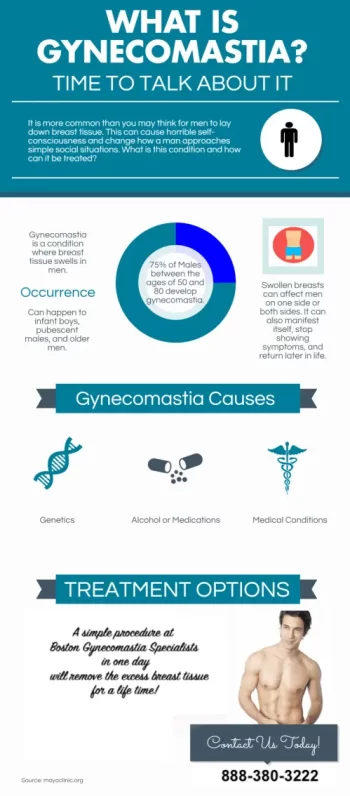
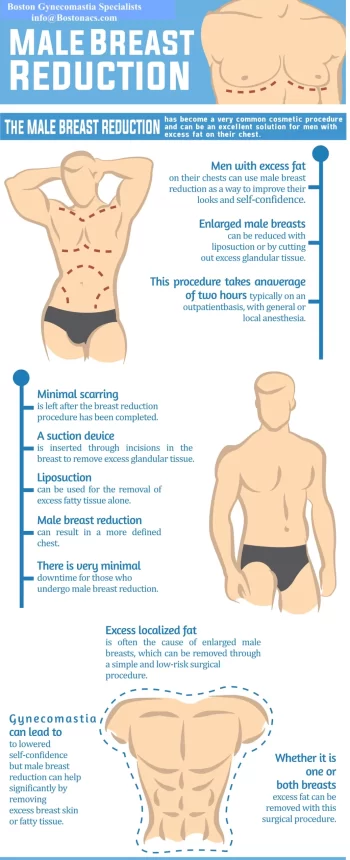
1260 Cambridge St
Cambridge, MA 02139
888-380-3222
info@BostonACS.com